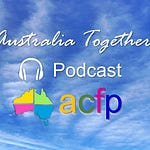Introduction from Bronwyn Kelly:
On 28 September 2023, representing Australian Community Futures Planning, I addressed the federal Parliamentary Joint Committee on Human Rights as a witness in its Inquiry into Australia’s Human Rights Framework. I made a case in support of a Human Rights Act but stated that the Constitution is a barrier to security of the human rights of Australians.
After my appearance at the Inquiry, Indigenous independent Senator Lidia Thorpe asked me two Questions on Notice:
You say the AHRC [Australian Human Rights Commission] proposal does not go far enough and unless human rights are constitutionally enshrined abuse of human rights will continue and we will see government enabled climate change, new stolen generations, state sanctioned violence, homelessness, poverty, health issues, pollution, corporate exploitation, and war. We look around and see this all currently happening and worst of all for First Peoples on our own land. Can you confirm your submission that unless a Bill or Charter of rights is constitutionally enshrined, there is no domestic legal way to hold the executive government accountable for passing laws that abuse human rights beyond the government of the day choosing how they are held accountable for breaches through [sic.]?
What is the biggest danger in pursuing the weaker AHRC proposal as opposed to the constitutional model?
In my appearance at the hearing I did indeed suggest that a Human Rights Act was a weaker proposal than constitutional enshrinement of rights, at least from the point of view that legislation can confer rights on Australians but unfortunately it won’t secure them. Without constitutional enshrinement of rights Australians will still be vulnerable to abuse or loss of their rights by executive government decisions when it is neither necessary nor just.
However, I didn’t suggest that the solution would be a bill or charter of rights in the Constitution. We need to do something new in the Constitution, but it isn’t a bill or charter. Quite a different form of constitutional enshrinement of human rights is required if we are to build a human rights framework that safely and equitably secures rights for Australians in democracy.
In my recent book, The People’s Constitution: the path to empowerment of Australians in a 21st century democracy, I have suggested that the necessary form of constitutional law on human rights is a National Agreement between all enfranchised Australians on Human Rights and Obligations. This is a different form of constitutional law to a charter or bill of rights.
This is not something that was discussed in my appearance before the parliamentary committee. So in this and the next two episodes of the Australia Together Podcast I’m providing my answers to Senator Thorpe’s questions in full. They’re really great questions and the answers go to the heart of how we should understand:
the very limited form of democracy we have in Australia,
how that is impacting our human rights, and
what we can do to make the Constitution fit for a 21st century democracy – one where everyone has political equality and is secure in all the human rights they need.
These answers have been published and are available on the federal parliamentary website at https://www.aph.gov.au/Parliamentary_Business/Committees/Joint/Human_Rights/HumanRightsFramework/Additional_Documents
Full transcript of this series on Insights into Human Rights and Democracy in Australia
Click here for a full transcript of Episodes 37, 38 and 39 on Insights into Human Rights and Democracy in Australia
Or find the transcript at the ACFP website at https://www.austcfp.com.au/supporting-activities
What’s the basis of Bronwyn Kelly’s testimony?
The full reasoning behind Bronwyn Kelly’s testimony to the Parliamentary Joint Committee on Human Rights can be found in her book, The People’s Constitution: the path to empowerment of Australians in a 21st century democracy, available in paperback here and on Kindle here. Or click on the picture below. Or visit the Australian Community Futures Planning website to purchase The People’s Constitution at https://www.austcfp.com.au/publications
Listen to the full reading of The People’s Constitution on Apple Podcast
A full reading of The People’s Constitution: the path to empowerment of Australians in a 21st century democracy is available in The Australia Together Podcast here.
Chapter headings of The People’s Constitution
Chapter 1: The limits of Australia’s representative democracy
Chapter 2: Setting a path to power for the people
Chapter 3: Finding a place to start
Chapter 4: Essentials for a new start as a nation
Chapter 5: Essential No. 1 – Building a statement of Australian national values
Chapter 6: Essential No. 2 – Enshrinement of human rights and obligations in an Australian people’s constitution
Chapter 7: Essential No. 3 – A process for expression on the Australian people’s national voice
Chapter 8: Essential No. 4 – Priority constitutional amendments for an inclusive democracy
Chapter 9: Processes for engagement on and adoption of The Australian People’
Chapter 10: The possibilities of a new democracy under a people’s constitution














Share this post